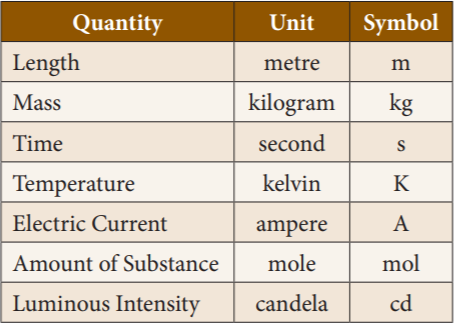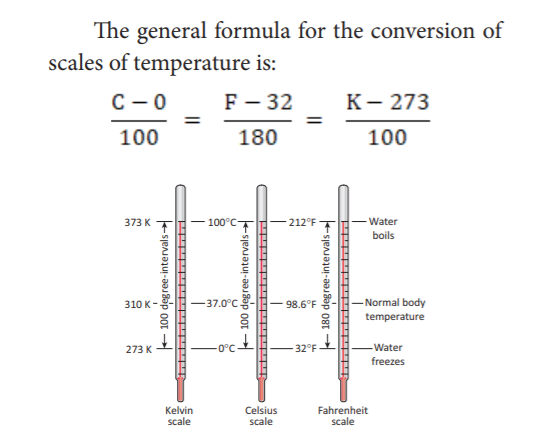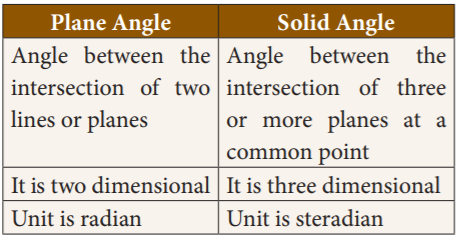8th Std Science Lesson Wise Questions in English – Part 1
8th Std Science Lesson Wise Questions in English
8th Science Lesson 1 Questions in English
1] Measurement
1. Which of the following statement is correct?
- Physics is the study of nature and natural phenomena
- Physics is based on experimental observations.
- 1 alone
- 2 alone
- 1, 2
- None
Explanation
Physics is the study of nature and natural phenomena. Physics is considered as the base of all science subjects. Physics is based on experimental observations.
2. Assertion(A): Scientific theories are valid, only if they are confirmed through various experiments
Reason(R): Theories in physics use many physical quantities that have to be measured.
- Both (A) and (R) are correct, but (R) does not explain (A)
- Both (A) and (R) are wrong
- Both (A) and (R) are correct and (R) explains (A)
- (A) is Correct and (R) is wrong
Explanation
The principles and observations allow us to develop a deeper understanding of nature. Scientific theories are valid, only if they are confirmed through various experiments. Theories in physics use many physical quantities that have to be measured.
3. Which of the following are the things necessary for perfect measurement?
- Instrument
- Standard quantity
- Acceptable unit
- 1, 2
- 1, 3
- 2, 3
- All the above
Explanation
Measurement is the base of all scientific studies and experimentations. We need three things for a perfect measurement. They are (i) an instrument, (ii) a standard quantity and (iii) an acceptable unit.
4. Which of the following is not one of the system of Units?
- CGS
- FPS
- KMH
- MKS
Explanation
People in various part of the world are using different systems of units for measurement. Some common systems of units are:
- FPS – System (Foot for length, Pound for mass and Second for time)
- CGS -System (Centimetre for length, Gram for mass and Second for time)
- MKS – System (Metre for length, Kilogram for mass and Second for time)
5. Which of the following is not a metric system?
- CGS
- MKS
- SI
- FPS
Explanation
The ‘CGS’, ‘MKS’ and SI units are metric systems of units and ‘FPS’ is not a metric system. It is a British system of units.
6. Assertion(A): In earlier days, scientists performed their experiments and recorded their results in their own system.
Reason(R): Due to lack of communication, they couldn’t organize other’s experimental results.
- Both (A) and (R) are correct, but (R) does not explain (A)
- Both (A) and (R) are wrong
- Both (A) and (R) are correct and (R) explains (A)
- (A) is Correct and (R) is wrong
Explanation
In earlier days, scientists performed their experiments and recorded their results in their own system. Due to lack of communication, they couldn’t organize other’s experimental results. So, the scientists planned to follow a uniform system for taking the measurements.
7. The 11th General Conference on Weights and Measures took place at_____
- Italy
- France
- Germany
- Britain
Explanation
As you studied in the lower classes, in 1960, in the 11th General Conference on Weights and Measures at Paris in France, the scientists recognized the need of using standard units for physical quantities. That was called as “International System of Units” and is popularly known as SI System (abbreviated from the French name ‘Systeme International’).
8. Match the following Base Quantities and Units:
- Luminous Intensity 1. Mole
- Time 2. Candela
- Amount of Substance 3. Second
- Mass 4. Kg
- 1, 2, 4, 3
- 3, 1, 2, 4
- 2, 3, 1, 4
- 2, 1, 3, 4
Explanation

9. Which space administration orbiter failed because of misunderstanding of system of units?
- NASA
- ISRO
- ESA
- JAXA
Explanation
In December 1998, the National Aeronautics and Space Administration (NASA), USA launched the Mars Climate Orbiter to collect the data of the Martian climate. Nine months later, on September 23, 1999, the Orbiter disappeared while approaching Mars at an unexpectedly low altitude. An investigation revealed that the orbital calculations were incorrect due to an error in the transfer of information between the spacecraft’s team in Colorado and the mission navigation team in California. One team was using the English FPS system of units for calculation, while the other group was using the MKS system of units. This misunderstanding caused a loss of approximately 125 million dollars.
10. Which of the following statement is correct?
- Temperature is a physical quantity that expresses the degree of hotness or coldness of a substance.
- Heat given to a substance will increase its temperature
- Heat removed from a substance will lower its temperature.
- 1, 2
- 1, 3
- 2, 3
- All the above
Explanation
Temperature is a physical quantity that expresses the degree of hotness or coldness of a substance. Heat given to a substance will increase its temperature. Heat removed from a substance will lower its temperature.
11. Temperature is a measure of_____ of the particles in a system.
- Average kinetic energy
- Average potential energy
- Kinetic energy at a point
- Potential energy at a point
Explanation
We need a reliable quantity to decide the degree of hotness or coldness of an object. That quantity is ‘temperature. Temperature is a measure of the average kinetic energy of the particles in a system.
12. The SI unit of Temperature is_____
- Celsius
- Fahrenheit
- Kelvin
- All the above
Explanation
The SI unit of Temperature is kelvin. ‘Thermometers’ are used to measure temperature directly. Usually, thermometers are calibrated with some standard scales. Celsius, Fahrenheit, Kelvin are the most commonly used scales to measure Temperature.
13. What is the melting point of water in Celsius thermometer?
- 100 degree Celsius
- 373 degree Celsius
- 37 degree Celsius
- 0 degree Celsius
Explanation
In these thermometers, melting point of pure ice (0°C) is taken as Lower Fixed Point (LFP) and Boiling point of water (100°C) is taken as Upper Fixed Point (UFP).
14. Number of divisions in Fahrenheit thermometer?
- 575
- 150
- 180
- 100
Explanation

15. Which of the following are equal?
- C/100
- (F-32)/180
- (K-273)/100
- 1, 2
- 1, 3
- 2, 3
- All the above
Explanation

16. Which of the following is scale graduated in clinical thermometers?
- Celsius
- Fahrenheit
- Kelvin
- All the above
Explanation
Physicians use ‘clinical thermometers. It is graduated in ‘Fahrenheit Scale’. “Normal temperature of the human body is between 98.4° F and 98.6° F”.
17. Scientists are using thermometers with_________
- Celsius
- Fahrenheit
- Kelvin
- All the above
Explanation
Scientists are using thermometers with kelvin scale. Common temperature measurements are made in Celsius scale. (Example: Weather reports are given in Celsius scale.)
18. ______ thermometer, measures the temperature of an object without any physical contact
- Celsius
- Fahrenheit
- Kelvin
- Infra-red
Explanation
Infra-red thermometer, measures the temperature of an object without any physical contact. Weather reports are given in Celsius scale.
19. Flow of electric charges, in a particular direction is known as_____
- Voltage
- Electric current
- Resistance
- Power
Explanation
Flow of electric charges, in a particular direction is known as ‘electric current’. The magnitude of an electric current is the amount of electric charge flowing through a conductor in one second.
20. SI unit of Electric Current is_______
- A
- V
- Ohm
- C/m
Explanation
SI unit of Electric Current is ‘ampere’ and it is denoted as A. Unit of charge is coulomb. One ampere is defined as one ‘coulomb’ of charge moving in a conductor in one second. Ammeter is a device used to measure ‘electric current.
21. Which of the following statement is correct?
- At very low temperature, around 30 K (-243.2° C), some conductors conduct electric current without any loss.
- These conductors are known as ‘SUPER- SONIC CONDUCTORS’
- The super conductors are used to levitate trains from the track.
- 1, 2
- 1, 3
- 2, 3
- All the above
Explanation
At very low temperature, around 30 K (-243.2° C), some conductors conduct electric current without any loss. These conductors are known as ‘SUPER CONDUCTORS’. Th e super conductors are used to levitate trains from the track. Super conductors can be used as memory or storage element in the computers.
22. Which of the following statement is correct?
- There is an indirect method to count the number of atoms or molecules in a substance in multiples of mole.
- Amount of substance is a measure of the number of entities (particles) present in a substance
- 1 alone
- 2 alone
- 1, 2
- None
Explanation
It is very difficult to count the number of atoms because the atoms are not visible. There is an indirect method to count the number of atoms or molecules in a substance in multiples of mole. Amount of substance is a measure of the number of entities (particles) present in a substance. The entity may be an atom, molecule, ion, electron or proton etc.
23. The SI unit of amount of substance is_______
- Atm
- Mole
- Gram
- Kilogram
Explanation
Generally, the amount of substance is directly proportional to the number of atoms or molecules. The SI unit of amount of substance is mole and it is denoted as ‘mol’.
24. Number of entities contained in a mole is_______
- 6.023 x 10^23
- 6.023 x 10^22
- 6.023 x 10^21
- 3.023 x 10^23
Explanation
Mole is defined as the amount of substance, which contains 6.023 x 10^23 entities. The number 6.023 × 10^23 is also known as Avogadro Number.
25. Intensity of light can be measured with_______
- Photometer
- Phonometer
- Luminometer
- Illuminous meter
Explanation
In cricket stadium umpire checks the intensity of light, as perceived by the human eye, by using an instrument called ‘Photometer’.
26. The SI unit of luminous intensity is________
- Cd
- Lumen
- Mol
- Col
Explanation
The measure of the power of the emitted light, by a light source in a particular direction, per unit solid angle is called as Luminous Intensity. The SI unit of luminous intensity is candela and is denoted as ‘cd’
27. What is the SI unit of Luminous Flux?
- Cd
- Lumen
- Mol
- Col
Explanation
Luminous Flux or luminous power is the measure of the perceived power of light. Its SI unit is ‘lumen’. One lumen is defined as the luminous flux of the light produced by the light source that emits one candela of luminous intensity over a solid angle of one steradian.
28. The SI unit of Plane Angle is_______
- Rad
- Sr
- Degree
- None
Explanation
Plane angle is the angle between the intersection of two straight lines or intersection of two planes. The SI unit of Plane Angle is ‘radian’ and is denoted as ‘rad’.
29. 1 radian =_________
- 180 degree
- 270/ π degree
- 180/3 degree
- 180°/ π
Explanation
Radian is the angle subtended at the centre of a circle by an arc whose length is equal to the radius of the circle.
π radian = 180°
1 radian = 180°/ π
30. The SI unit of solid angle is__________
- Rad
- Sr
- Degree
- None
Explanation
Solid Angle is the angle formed by three or more planes intersecting at a common point. It can also be defined as ‘angle formed at the vertex of the cone’. The SI unit of solid angle is ‘steradian’ and is denoted as ‘sr’.
31. Solid Angle is_________ dimensional
- Two
- Three
- Four
- One
Explanation

32. Which of the following statement is incorrect?
- Clocks are used to measure time intervals.
- Scientists modified the clock’s mechanism to obtain accuracy
- 1 alone
- 2 alone
- 1, 2
- None
Explanation
Clocks are used to measure time intervals. So, many clocks were used from the ancient time. Scientists modified the clock’s mechanism to obtain accuracy
33. Which of the following statement is correct?
- Hours Hand is short and thick
- Minutes Hand is long and thin
- Seconds Hand is long and very thin.
- 1, 2
- 1, 3
- 2, 3
- All the above
Explanation
Analog clock has three hands to show the time.
Hours Hand: It is short and thick. It shows ‘hour’.
Minutes Hand: It is long and thin. It shows ‘minute’.
Seconds Hand: It is long and very thin. It shows ‘second’. It makes one rotation in one minute and 60 rotations in one hour.
34. Which of the following statement is correct?
- A digital clock displays the time directly
- It can be driven either mechanically or electronically
- Digital clocks are often called as Electronic Clocks.
- 1, 2
- 1, 3
- 2, 3
- All the above
Explanation
A digital clock displays the time directly. It shows the time in numerals or other symbols. It may have a 12 hours or 24 hours display. Recent clocks are showing Date, Day, Month, Year, Temperature etc. Digital clocks are often called as Electronic Clocks. Analog clocks can be driven either mechanically or electronically.
35. Quartz clocks have an accuracy of one second in every_______ s
- 10^9
- 10^7
- 10^3
- 10^6
Explanation
Quartz Clocks are activated by ‘electronic oscillations’, which are controlled by a ‘quartz crystal’. The frequency of a vibrating crystal is very precise. So, the quartz clock is more accurate than the mechanical clock. These clocks have an accuracy of one second in every 10^9 seconds
36. Which of the following statement is incorrect?
- The principle of a quartz clock is the Piezo – electric property of a crystal
- Piezo-electric property means that when a pressure is applied along a particular axis of a crystal, an electric potential difference is developed in a perpendicular axis
- 1 alone
- 2 alone
- 1, 2
- None
Explanation
The principle of a quartz clock is the Piezo – electric property of a crystal. Piezo-electric property means that when a pressure is applied along a particular axis of a crystal, an electric potential difference is developed in a perpendicular axis. In the reverse piezo-electric effect, a crystal becomes mechanically stressed when a voltage is applied across its opposite faces.
37. Atomic Clocks have an accuracy of one second in every___ s
- 10^13
- 10^10
- 10^7
- 10^12
Explanation
Atomic Clock are making use of periodic vibrations occurring within the atom. These clocks have an accuracy of one second in every 10^13 seconds.
38. Atomic clocks are used in______
- GIS
- GPS
- GLONASS
- 1, 2
- 1, 3
- 2, 3
- All the above
Explanation
Atomic clocks are used in Global Positioning System (GPS), Global Navigation Satellite System (GLONASS) and International time distribution services
39. The first atomic clock was developed in___________
- 1946
- 1949
- 1947
- 1945
Explanation
The first atomic clock was developed in 1949 at the US National Bureau of Standards. But, it was less accurate than the quartz clock.
40. The first accurate atomic clock was based on_______
- Radium
- Polonium
- Caesium
- Uranium
Explanation
The first accurate atomic clock (based on Caesium – 133) was built by Lauis Essan and Jack Penny in 1955, at the National Physics Laboratory in the United Kingdom.
41. Time difference between two adjacent time zones is_____
- 2 hours
- 1 hour
- 4 hours
- 33 minutes
Explanation
Time difference between two adjacent time zones is 1 hour. Greenwich Mean Time (GMT) is the mean solar time at the Royal Observatory, located at Greenwich in London.
42. The Earth is divided into____ zones
- 24
- 36
- 18
- 22
Explanation
The Earth is divided into 24 zones, each of a width of 15-degree longitude. These regions are called as ‘Time Zones’.
43. IST of India is located in_____
- Gazipur
- Mirzapur
- Allahabad
- Prayagraj
Explanation
The location of Mirzapur in Uttar Pradesh is taken as the reference longitude of the Indian Standard Time. It is located at 82.5-degree longitude.
IST = GMT + 5:30 hours
44. Which of the following statement is correct?
- Measurement is the base of all experiments in science and technology
- The value of every measurement contains some uncertainty
- The difference between the real value and the observed value is called an error
- 1, 2
- 1, 3
- 2, 3
- All the above
Explanation
Measurement is the base of all experiments in science and technology. The value of every measurement contains some uncertainty. These uncertainties are called as ‘Errors’. The difference between the real value and the observed value is called an error.
45. Convert 80° C into kelvin.
- 353 Kelvin
- 473 Kelvin
- 273 Kelvin
- 300 Kelvin
Explanation
K = C + 273
K = 80 + 273
K = 353 kelvin
46. Convert 300 K into Celsius.
- 27
- 37
- 47
- 17
Explanation
C = K – 273
C = 300 – 273
C = 27 Celsius.
47. Convert 60° into radian.
- π/6
- π/3
- π/2
- 2π/3
Explanation
1° = π/ 180
60° = π × 60/ 180
= π/ 3 radian
48. Convert π/ 4 into degrees.
- 40
- 30
- 45
- 15
Explanation
π radian = 180°
π/ 4 radian = 180/ 4
= 45°